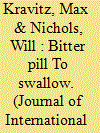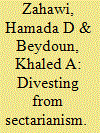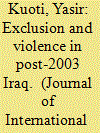|
|
|
Sort Order |
|
|
|
Items / Page
|
|
|
|
|
|
|
| Srl | Item |
| 1 |
ID:
148666


|
|
|
|
|
| Summary/Abstract |
Indiscriminate killing, chemical warfare, the rise of extremists, and the worst humanitarian crisis since World War II make it easy to overlook important details of the Syrian conflict. The destabilization of Syria has created an environment uniquely suited for cultivating illicit economies, particularly the production and transportation of illegal drugs such as Captagon. Little known outside of the Middle East until 2014, Captagon production in Syria adds a new dimension to a conflict that already has numerous competing forces. Hezbollah, a known supporter of the Assad regime and ally of Iran, is most likely the major producer of Captagon within Syria. Meanwhile, the most prolific consumers of Captagon are in the Gulf nations of Saudi Arabia, Qatar, and the United Arab Emirates. While the Gulf states’ governments are supporting the Syrian opposition against the Assad regime, their populations are financially supporting the Hezbollah and Assad. This article defines Captagon, uncovers its journey to Syria, and unpacks the evidence indicating Hezbollah’s involvement in the Captagon trade. Nations of the Gulf need to bolster their partnerships with Western allies to put an end to illegal drug financing through acknowledgement, education, and increased enforcement.
|
|
|
|
|
|
|
|
|
|
|
|
|
|
|
|
| 2 |
ID:
148671


|
|
|
|
|
| Summary/Abstract |
This article points out the cataclysmic power shift that would take place in the event of Saudi Arabia’s descent into political turmoil, and briefly covers some of the catalysts that could bring about such an event. Overall, the oppressive policies towards the Shia minority carried out by the Sunni-dominated Saudi monarchy are detrimental to the country’s national security. The religious disparities in the country have given the monarchy’s enemies—primarily Iran and Russia—a weakness to exploit. This article does not give evidence of any clandestine operations taking place within the Kingdom; however, it gives evidence that Iran and Russia have much to gain and virtually nothing to lose if the country was to spiral into violence like so many others in the region.
|
|
|
|
|
|
|
|
|
|
|
|
|
|
|
|
| 3 |
ID:
148664


|
|
|
|
|
| Summary/Abstract |
Several factors contribute to or inhibit the “contagiousness” of regional conflict and irregular warfare, whether conducted at the interstate, extrastate, or intrastate level. Five broad drivers of the diffusion of regional conflict are (1) weak states, (2) anticipated power shifts, regional and domestic, (3) unstable and poorly controlled border regions, (4) large refugee flows, and (5) the religiously-based non-state militant campaign against the state as an organizing principle of world politics. These factors are both endogenous and exogenous to particular states and societies, and must be considered alongside the standard factors considered in international relations literature to be the basis of “dangerous state dyads:” geographic contiguity, absence of alliances, absence of an advanced economy, absence of a democratic polity, and absence of a regionally preponderant power. Two case studies illustrate this argument: the rise of Islamic State, and the awareness of the causes of contagion in regional conflict implicit in Israeli security policy.
|
|
|
|
|
|
|
|
|
|
|
|
|
|
|
|
| 4 |
ID:
148667


|
|
|
|
|
| Summary/Abstract |
Until recently, Iran has been economically isolated by way of sanctions, preempting investment opportunities with states allied with the United States. However, the Obama administration’s recent effort towards economic normalization with Iran affords it with unprecedented commercial possibilities, and per the focus of this article, legalized commercial enterprising within Saudi Arabia, the United Arab Emirates, and other Gulf Cooperation Council (GCC) States—across sectarian tensions and fault lines. From both a legal and practical prism, this article investigates the recent lifting of sanctions, which opens the door for Iran’s investment within neighboring states including the GCC. Subsequently, it analyzes how commercial investment and the reciprocal advancement of economic interests offers a promising pathway toward eroding political standoffs, economic inequities, and the politicization of sectarianism. In closing, the article addresses salient challenges that may hinder the potential of this economic rapprochement, and ways forward.
|
|
|
|
|
|
|
|
|
|
|
|
|
|
|
|
| 5 |
ID:
148665


|
|
|
|
|
| Summary/Abstract |
This paper examines the origins of political violence in Iraq. It argues that, in the wake of the democratic transition process in from 2004 to 2005, Iraqi exiles, who were chiefly Shiite Muslims and Kurds appointed by Paul Bremer, Iraq’s U.S. civilian administrator, moved to write a constitution and set up a political system that deliberately marginalized minorities. Since then, the Sunni minority began and continues to engage in or support violence against the state. It suggests that violence and instability in Iraq are to be understood in terms of local contexts of meaning, notably the nature of struggle for political power.
|
|
|
|
|
|
|
|
|
|
|
|
|
|
|
|
| 6 |
ID:
148669


|
|
|
|
|
| Summary/Abstract |
Following the uprisings in the Arab world, the region has lurched into a period of massive change and instability. An unfortunate consequence of this change has been the rise and proliferation of militant groups such as ISIS (Islamic State in Iraq and al-Sham) and Jubhat al-Nusra in Iraq and Syria. These militant groups successfully recruit members from the region and beyond, fueling conflict in countries that have witnessed unrest, such as Libya, Tunisia, Egypt, Yemen, Iraq, and Syria. Although Jordan has long been seen as a regional hub of stability and security, especially by its Western allies, it increasingly exhibits symptoms of the long-standing pressures exerted upon it by the surrounding conflicts, resulting refugee crises, and pre-existing domestic challenges. Jordan’s hypothetical fall into instability could have catastrophic consequences for the region, exacerbating the crises in Syria and Iraq, empowering ISIS and other militant groups, and threatening regional and global security. In response, this article offers a general framework for the expansion of the country’s nascent Counter Violent Extremism (CVE) program, including both preventative and remedial measures. Beginning with an overview of the processes of radicalization and de-radicalization, this article proceeds with a brief discussion of Jordan’s current situation before synthesizing scholarly articles and analyses of other CVE programs in order to establish a framework to guide Jordan’s developing CVE interventions.
|
|
|
|
|
|
|
|
|
|
|
|
|
|
|
|
| 7 |
ID:
148672


|
|
|
|
|
| Summary/Abstract |
My story started in Syria in 2003. I was a gay teenager coming out of the closet to my family. Shortly after, I had to escape to Egypt. Back then, I really thought Egypt could be the answer to the problems I experienced in Syria as a result of my sexuality. In reality, that was the first time I became a refugee. All I had was a gym bag full of clothes and $200 in my pocket. But within my first weeks in Egypt, I was advised to keep my sexuality to the limits of the gay community.
|
|
|
|
|
|
|
|
|
|
|
|
|
|
|
|
| 8 |
ID:
148670


|
|
|
|
|
| Summary/Abstract |
This article examines the situation of Iran’s Bahá’í community, the country’s largest non-Muslim religious minority, in the context of the Islamic Republic’s legal framework as well as President Hassan Rouhani’s proposed Citizenship Rights Charter. Discussing provisions of the Iranian Constitution, Iran’s criminal statute known as the Islamic Penal Code, and the proposed Citizenship Rights Charter, it is demonstrated that the Iranian government has institutionalized religious discrimination. Several examples of discrimination against Iranian Bahá’ís are provided to show the broad scope of these practices and how they impact individual Bahá’ís.
|
|
|
|
|
|
|
|
|
|
|
|
|
|
|
|
| 9 |
ID:
148673


|
|
|
|
|
| Summary/Abstract |
As a result of the 70-year conflict between Israel and Palestine, the United States should reconsider its support for a two-state solution and instead pivot to a one-state solution. Policymakers have assumed that deep hatreds can only be settled through separation. However, this policy has caused a stalemate and does not take into account fluctuating developments in the region. A more adaptive strategy is necessary. Using theories of ripeness and conflict mediation, this bold flip in policy can pave the path towards lasting peace. Exercising the instability created from Syria’s civil war, the United States. can ripen the Israel-Palestine conflict by exposing the mutual security benefits gained from uniting against a common enemy: ISIS. The Islamic State of Iraq and Syria offers the parties a unique opportunity for peace as a rallying cause. As a close ally of Israel, the United States is in the ideal position to lead mediations centering around talks of permanent ceasefires, economic integration, and eventually political power sharing of a unified, binational state. In conjunction with Qatar acting as the Arab broker for Palestine, the United States should leverage its power to get the parties to the table in order to create the framework for a pocket of peace in an ever-rickety Middle East.
|
|
|
|
|
|
|
|
|
|
|
|
|
|
|
|
| 10 |
ID:
148668


|
|
|
|
|
| Summary/Abstract |
The important role of young people in building peace and challenging violent extremism is gaining recognition within the international community. The United Nations Security Resolution on Youth, Peace, and Security (SCR 2250), passed in December 2015, is evidence of this trend. It represents a shift from the dichotomy of youth as either perpetrators or victims of violence to a perspective in which youth are viewed as agents of positive change and peace. In moving forward with this resolution and similarly reflective and supportive policy, one of the greatest challenges for the Middle East and North Africa will be the current geopolitical context and obstacles to opportunity. In a region fraught with conflict, stemming from domestic and foreign policies, as well as a history of unrepresentative and repressive governance systems, leaders have often sought to maintain the status quo. This is a problem in a region where more than 30 percent of the population is between 15 and 29 years of age, and are increasingly frustrated with and stymied by a lack of meaningful political space—leading to lost faith in political systems.1 In such a setting, regional policymakers must be challenged to meaningfully incorporate young people into decisionmaking processes, to ensure that peacebuilding programs target young people early on in their development, to avoid the securitization of youth in the development and implementation of national and local policies, and to address the underlying social, economic, and political grievances that often drive extremism and impact young people’s relationships with their communities and states.
|
|
|
|
|
|
|
|
|
|
|
|
|
|
|
|
|
|
|
|
|